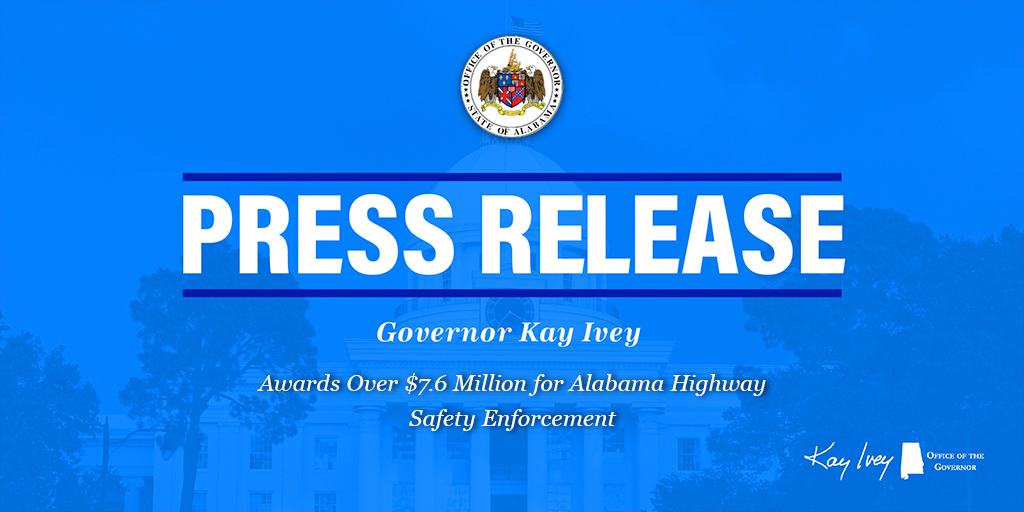Governor Ivey Awards Over $7.6 Million for Alabama Highway Safety Enforcement

MONTGOMERY— Governor Kay Ivey has awarded more than $7.6 million to enhance highway safety in Alabama and reduce the number of reckless drivers on the state’s roads.
The grants provided to the Alabama Law Enforcement Agency (ALEA) and the state’s traffic safety regions covering all 67 counties will help fund major highway safety campaigns including “Click It or Ticket” and “Drive Sober or Get Pulled Over.” The funds will also enable law enforcement agencies to increase traffic patrols in areas with high crash rates and other traffic violations.
“Responsible law-abiding motorists deserve to travel safely on our highways and roads,” said Governor Ivey. “These funds will support our police officers, sheriff’s deputies and state troopers who work tirelessly to ensure that those who break our traffic laws are either ticketed for their reckless behavior or removed from the roads.”
The funds will cover overtime costs for law enforcement officers to conduct extra patrols during peak travel times targeting speeding, seat belt violations and impaired driving.
“During the past several years, the Alabama Law Enforcement Agency has recorded a steady decrease in overall traffic fatalities across the state. This downward trend and the lives saved on our roadways are a direct reflection of Governor Ivey’s leadership and effort to prioritize public safety throughout her administration,” said ALEA Secretary Hal Taylor. “Although our work is never done, support from Governor Ivey and the Alabama Department of Economic and Community Affairs enables us and our law enforcement partners to continue to work toward our mission of reducing traffic crashes and saving lives.”
Funds will be dispersed to law enforcement agencies within a region based on the size of the force and crash and traffic data in their jurisdictions.
The Alabama Department of Economic and Community Affairs (ADECA) is administering the grants using funds made available to the state by the National Highway Traffic Safety Administration. ADECA manages various programs that support law enforcement and traffic safety, energy conservation, water resource management, economic development and recreation.
“ADECA supports Governor Ivey in her efforts to reduce traffic crashes and make our roads safer,” said ADECA Director Kenneth Boswell. “Like Governor Ivey, we are grateful for the dedication of our law enforcement agencies in Alabama who work hard to protect their communities.”
Governor Ivey awarded the following grants to agencies that serve as fiscal agents for the highway safety districts:
- $3.15 million to the Franklin County Commission for the North Central and East Central Regional Highway Safety offices. The two offices serve Blount, Calhoun, Cherokee, Clay, Cleburne, Colbert, Coosa, Cullman, DeKalb, Elmore, Etowah, Fayette, Franklin, Lamar, Lauderdale, Lawrence, Limestone, Jackson, Jefferson, Madison, Marshall, Marion, Morgan, Shelby, St. Clair, Talladega, Tallapoosa, Walker and Winston counties.
- $1.5 million for the Southeast Alabama Regional Highway Safety Office at Enterprise State Community College. The office serves Autauga, Barbour, Bullock, Butler, Coffee, Covington, Crenshaw, Dale, Geneva, Henry, Houston, Lowndes, Montgomery, Pike and Russell counties.
- $1.36 million to the Mobile County Commission for the Southwest Regional Highway Safety Office which serves Baldwin, Bibb, Chambers, Chilton, Choctaw, Clarke, Conecuh, Dallas, Escambia, Greene, Hale, Macon, Marengo, Mobile, Monroe, Lee, Perry, Pickens, Randolph, Sumter, Tuscaloosa, Washington and Wilcox counties.
- $1.6 million to ALEA whose state troopers cover the entire state. Part of those funds will be used for the Drug Recognition Expert Program which trains officers, deputies and troopers to determine if a person suspected of impairment is under the influence of a drug or drugs other than alcohol, the combined influence of alcohol and other drugs or is suffering from an injury or illness that produces similar signs of alcohol or drug impairment.
###
Provided by the Office of the Governor of Alabama | governor.alabama.gov

